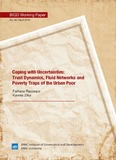Coping with uncertainties: Trust dynamics, fluid networks and poverty traps of the urban poor

View/Open
Date
2018-04Publisher
BRAC Institute of Governance and Development (BIGD)Metadata
Show full item recordAbstract
Over the recent decades, poverty has increasingly become more urbanized, driven partially by the large volume of rural to urban migration. The urban poor not only have to deal with living in overcrowded slums or other low-income settlements, but also tackle social and economic deprivations and struggle to enter the highly competitive urban workforce, and maintain a basic livelihood. With the objective of learning how the urban poor cope with uncertainties, this qualitative research was conducted to identify the role of social networks in the context of urban poverty and how the poor, living in Dhaka city, use them as a coping mechanism. The study sought to capture the generation of social capital (networks, trust dynamics) in poor communities, particularly in slums and low-income settlements in Dhaka city. The data suggests that the urban poor form single-purpose networks with multiple individuals within their communities to fulfil various economic and social needs to improve their living. Single-purpose networks are imperative for the poor to be able to cope with certain uncertainties. However, certain other issues require a stronger trust foundation between the individuals in a network. This leads to the formation of multipurpose networks, where trust dynamics and the subsequent faith and reliability play a pivotal role. The study also finds that the use of social capital and information networks to secure employment is a common practice within low-income communities.
